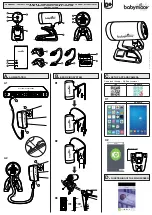
27
Performing the blood pressure measurement
Measur
ement
• To start the blood pressure monitor, press
the Start/stop button . All display ele-
ments are briefly displayed.
• Using the buttons
+
, select the user mem-
ory 1 or 2. Start the measurement pro-
cess by pressing ON/OFF button . After
checking the display with all digits lighting
up, the monitor will automatically inflate.
• The blood pressure monitor will begin the
measurement automatically after approx. 3
seconds. The cuff inflates as the first step.
Measuring can be cancelled at any time by pressing
the Start/stop button .
• Then the air pressure in the cuff is slowly released.
Now the measurement starts. As soon as a pulse is
found, the pulse symbol is displayed.
• If a tendency towards high blood pressure can already
be identified, it is possible that the cuff may inflate
again to a higher pressure level whilst the air is being
released.
• The remaining air is released quickly once the meas-
urement is complete.
• Systolic pressure, diastolic pressure and
pulse measurements are displayed.
Measur
ement
•
appears if the measurement could not
be performed properly. In this case, please
read the section “What if there are prob-
lems?”.
Evaluating the results
General information about blood pressure
• Blood pressure is the force with which the bloodstream press-
es against the arterial walls. Arterial blood pressure constantly
changes in the course of a cardiac cycle.
• Blood pressure is always stated in the form of two values:
– The highest pressure in the cycle is called
systolic blood
pressure
. This arises when the heart muscle contracts
and blood is pumped into the blood vessels.
– The lowest is
diastolic blood pressure
, which is when the
heart muscle has completely stretched back out and the
heart fills with blood.
• Fluctuations in blood pressure are normal. Even during repeat
measurements, considerable differences between the meas-
ured values may occur. One-off or irregular measurements
therefore do not provide reliable information about the actual
blood pressure. Reliable assessment is only possible when
you perform the measurement regularly under comparable
conditions.
Cardiac arrhythmia
This device can identify any cardiac rhythm disturbances as
part of the analysis of your recorded pulse signal during blood
Summary of Contents for BM 35
Page 98: ...98 Beurer 1 99 2 99 3 100 4 101 5 103 6 104 7 105 8 110 9 111 10 111 11 112 12 113 13 114...
Page 99: ...99 1 4 1 5 LR03 2 BF F floating BF WEEE Waste Electrical and Electronic Equipment 21 PAP...
Page 100: ...100 IP22 IP 12 5 SN CE 3 Tempestas...
Page 101: ...101 4...
Page 102: ...102 20 C 2...
Page 103: ...103 5 1 2 3 4 5 MEM 6 7 8 9 10 1 3 2 4 5 8 6 9 10 7...
Page 105: ...105 5 Tarih 12 Saat 7 30 5...
Page 106: ...106 1 163 537 22 36 cm 162 973 30 42 cm 2 3 OK...
Page 107: ...107 22 36 162 973 30 42 START STOP 3 START STOP 1 2...
Page 108: ...108...
Page 109: ...109 180 110 160 179 100 109 140 159 90 99 130 139 85 89 120 129 80 84 120 80 1999...
Page 110: ...110 60 MEM MEM MEM 7 5 00 9 00 MEM 7 17 00 21 00 MEM MEM MEM 5 8...
Page 111: ...111 9 22 36 163 537 30 42 162 973 10 E1 25 E2 300...
Page 112: ...112 E3 E3 E3 11 WEEE Waste Electrical and Electronic Equipment Pb Cd Hg...
Page 114: ...114 EN1060 3 3 IEC80601 2 30 2 30 13...
Page 131: ...131...
















































